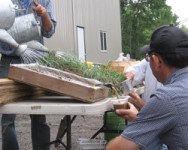Event Details
Date
Aug 11 - Aug 13, 2015
Time
9:30 AM each day
Location
Empire Farm Days, Lot #922
Rodman Lott & Son Farms, Rt 414
Seneca Falls, NY 13148
Cost
$10.00 Parking fee at Empire Farm Days. No admission fee.
Host
NYS Soil Health Working Group
Paul Salon, USDA-NRCS
email Paul Salon, USDA-NRCS
Soil Health Seminar Center & Demo Plots at Empire Farm Days
August 11 - August 13, 2015
Join us at the new Soil Health Seminar Center on August 11-13, 2015, to hear and meet nationally renowned soil health researchers, industry speakers, and experienced growers. Cover crop demos, and inter-seeded soybean plots and equipment, will be nearby. This new center is at Empire Farm Days Lot #922, Rodman Lott & Sons Farms, Rt. 414, Seneca Falls. Presentations will occur mornings beginning at 9:30 am. Featured topics each day include new practices and innovations in:
Tuesday - Cover Crops
Wednesday - Reduced Tillage
Thursday - Nutrient Management
Soil Scientist William Brinton, inventor of the SolvitaŽ test for soil respiration, Woods End Soil Lab, Mt. Vernon, ME, will speak Tuesday and Wednesday on soil biology, and on soil health testing and management. Agronomist Dave Wilson, Kings Agriseeds, and Farm Sales Manager Adam Robertson, Seedway, will speak Tuesday and Wednesday, respectively. Karl Czymmek, Cornell Management SPEAR Program, and Dave DeGolyer, WNY Crop Management Association, will speak Thursday. Grower panelists will focus on the days topic.
Lunch will be sponsored by Kings Agriseeds for those attending the morning program. USDA-NRCS, SWCD, Cornell and CCE Cornell Vegetable Program staff will be present to offer technical assistance or describe cost-share programs.
For info on Empire Farm Days go to http://empirefarmdays.com/
For more info on the Soil Health program at EFDs contact Paul Salon, USDA-NRCS.
Organized by the NYS Soil Health Working Group, made up of USDA-NRCS and SWCD reps, Cornell Cooperative Extension, and growers.



































